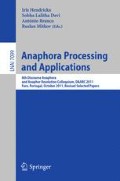Abstract
Findings from various domains suggest that predictability is an important component of language processing. We report psycholinguistic research suggesting that predictability also influences referential processing, in the form of reduced acoustic durations for predictable referents. However, we do not find evidence that predictability directly influences likelihood of pronominalization, contrary to some prior claims. Instead, our data indicate that the use and interpretation of pronouns is influenced by thematic role, independently of which referent is most predictable, i.e., most likely to be mentioned next. We suggest that likelihood-of-mention is influenced by the mapping between syntactic and thematic roles. Our results highlight the benefits of exploring both lexical and acoustic aspects of referential production.
Access this chapter
Tax calculation will be finalised at checkout
Purchases are for personal use only
Preview
Unable to display preview. Download preview PDF.
References
Arnold, J.: Reference production: Production-internal and addressee-oriented processes. Language and Cognitive Processes 23, 495–527 (2008)
Arnold, J.: The Effect of Thematic Roles on Pronoun Use and Frequency of Reference Continuation. Discourse Processes 31(2), 137–162 (2001)
Asher, N., Lascarides, A.: Logics of Conversation. Cambridge University Press (2003)
Bell, A., et al.: Effects of disfluencies, predictability, and utterance position on word form variation in English conversation. J. Acoustic Society of America. 113, 1001–1024 (2003)
Fukumura, K., van Gompel, R.: Choosing anaphoric expressions: Do people take into account likelihood of reference? J. Memory and Language 62, 52–66 (2010)
Givón, T.: Mind, Code and Context: Essays in Pragmatics. Lawrence Erlbaum (1989)
Grimshaw, J.: Argument Structure. MIT Press, Cambridge (1990)
Hale, J.: A Probabilistic early parser as a Psycholinguistic Model. In: NACCL, vol. 2, pp. 159–166 (2001)
Hume, E., Mailhot, F.: The role of entropy and surprisal in phonologization and language change. In: Yu, A. (ed.) Origins of Sound Patterns, University Press (to appear)
Jurafsky, D., Bell, A., Gregory, M., Raymond, W.: Probabilistic relations between words. Frequency and the Emergence of Linguistic Structure, pp. 229–254. John Benjamins (2001)
Kaiser, E.: Investigating the Consequences of Focus on the Production and Comprehension of Referring Expressions. J. International Review of Pragmatics 2, 266–297 (2010)
Kaiser, E., Holsinger, E., Li, D.: Who next? Consequences of syntax-semantics mismatches for likelihood of mention. In: Human Sentence, Stanford (2011)
Kehler, A.: Coherence, Reference, and the Theory of Grammar. CSLI Publications (2002)
Kehler, A., Kertz, L., Rohde, H., Elman, J.: Coherence and coreference revisited. J. Semantics 25, 1–44 (2008)
Kertz, L., Kehler, A., Elman, J.: Evaluating a Coherence-Based Model of Pronoun Interpretation. In: Workshop on Ambiguity in Anaphora, Malaga, Spain (2006)
Levy, R.: Expectation-based syntactic comprehension. Cognition 106, 1126–1177 (2008)
Rohde, H.: Coherence-Driven Effects in Sentence and Discourse Processing. Ph.D., UC San Diego (2008)
Stevenson, R., Crawley, R., Kleinman, D.: Thematic roles, focusing and the representation of events. Language and Cognitive Processes 9, 519–548 (1994)
Author information
Authors and Affiliations
Editor information
Editors and Affiliations
Rights and permissions
Copyright information
© 2011 Springer-Verlag Berlin Heidelberg
About this paper
Cite this paper
Kaiser, E., Li, D.CH., Holsinger, E. (2011). Exploring the Lexical and Acoustic Consequences of Referential Predictability. In: Hendrickx, I., Lalitha Devi, S., Branco, A., Mitkov, R. (eds) Anaphora Processing and Applications. DAARC 2011. Lecture Notes in Computer Science(), vol 7099. Springer, Berlin, Heidelberg. https://doi.org/10.1007/978-3-642-25917-3_15
Download citation
DOI: https://doi.org/10.1007/978-3-642-25917-3_15
Publisher Name: Springer, Berlin, Heidelberg
Print ISBN: 978-3-642-25916-6
Online ISBN: 978-3-642-25917-3
eBook Packages: Computer ScienceComputer Science (R0)

